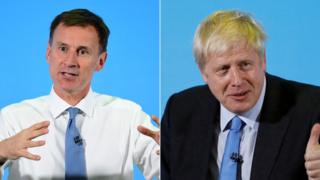 Image copyright
Image copyright
Getty images/Reuters
Voting will close later in the Conservative leadership contest, with the UK’s next prime minister set to be announced on Tuesday.
Party members will have until 17:00 BST to return their ballots for either Jeremy Hunt or Boris Johnson, regarded as the frontrunner in the contest.
The winner and successor to Theresa May is due to take office on Wednesday.
On Sunday, Philip Hammond told the BBC he intends to resign as chancellor if Mr Johnson becomes PMprime minister.
Mr Hammond told the BBC’s Andrew Marr Show he could not “sign up” to Mr Johnson’s Brexit strategy, which requires leaving the EU before 31 October, with or without a deal.
His announcement followed Justice Secretary David Gauke reiterating in the Sunday Times that he would also resign this week for the same reason.
‘Sense of mission’
Mr Johnson has said the UK must leave the EU by the new Brexit deadline of 31 October “do or die, come what may”, while Mr Hunt has said he is prepared to further delay Brexit, if required, to get a new withdrawal deal.
Writing in the Daily Telegraph, Mr Johnson insisted a deal could be reached by 31 October if the country “rediscovers its sense of mission”.
“We can come out of the EU on 31 October, and yes, we certainly have the technology to do so,” he wrote.
“What we need now is the will and the spirit.”
Image copyright
AFP/Getty Images
Gordon Brown and Tony Blair have warned about what they see as the dangers of a no-deal Brexit
Meanwhile, with the next prime minister due to be announced this week, two former Labour prime ministers have warned about what they see as the dangers of leaving the EU without a deal.
Writing in the Times, Tony Blair said a no-deal exit could range from being “very difficult” to “catastrophic”.
“No one knows with certainty the impact of no deal for the simple reason that no developed nation has ever left overnight its preferential trading arrangements in this manner,” he wrote.
Mr Blair added that there was “no prospect” of a new deal with the EU that Mr Johnson would approve of, arguing that a second Brexit referendum was the solution.
Gordon Brown, meanwhile, is to claim in a speech in London that leaving without a deal would push the British economy “off a cliff”.
Analysis
BBC political correspondent Chris Mason
This is the week where everything changes, and, perhaps, nothing changes at all.
A week where the old establishment becomes the new rebels; where the crowd-pleasing showman throwing rhetorical rocks at the leadership becomes, in all likelihood, the leader himself.
The differences in temperament and character between the outgoing prime minister and her likely successor, Boris Johnson, could hardly be more stark.
Can you imagine, for even a moment, Theresa May dangling forlorn from a zipwire?
But while a change in personnel is coming, so many of the fundamentals remain the same.
Where Mrs May looked nervously over her shoulder at rebels like Brexiteer Jacob Rees Mogg, Mr Johnson may do the same at opponents of the no deal Brexit he’s willing to contemplate, such as the soon to be former Chancellor, Philip Hammond, and the soon to be former Justice Secretary, David Gauke.
Opposing concerns, presenting the same problem for a different occupant of Downing Street: Rebels whose capacity to be awkward is turbo charged because their party has a barely existent majority.
And so, after the formalities of the handover of power and the rhetoric of the new prime minister’s vision, some core, unchanged facts:
A withdrawal agreement the EU says is closed, and Parliament says it hates.
A deadline – 31 October – ticking ever closer.
And a prime minister facing loud opposition in Parliament.
Sound familiar?
So there is one big question: Can Boris Johnson, if it is him, succeed where Theresa May failed?
And if he can, what will success look like?
Last week, MPs approved measures aiming to stop the next prime minister suspending Parliament to force through a no-deal Brexit.
Mr Hunt has ruled this out as a way to ensure Brexit takes place before the end of October – but Mr Johnson has not done the same.
On Sunday, former Tory leader Iain Duncan Smith – who is managing Mr Johnson’s campaign – said the issue was a “complete red herring”.
He said the suspension – or prorogation – of Parliament was not “the real debate” because MPs had already fixed the 31 October exit date in law.
Image copyright
PA Media/Getty Images
Either deputy leader Jo Swinson or former Energy Secretary Ed Davey will be announced as the Lib Dems next leader on Monday
Meanwhile, the Liberal Democrats will announce the winner of their own contest to find a new leader, replacing Sir Vince Cable.
Either deputy leader Jo Swinson or former energy secretary Ed Davey will be announced as the party’s next leader on Monday afternoon.












